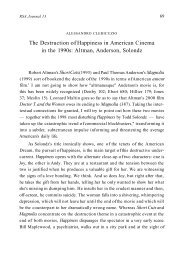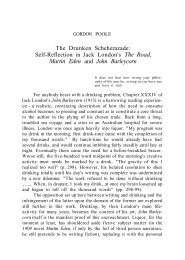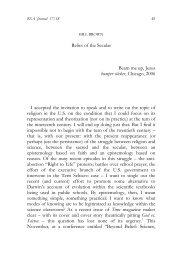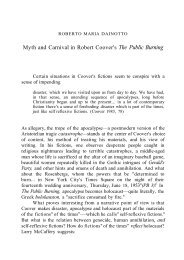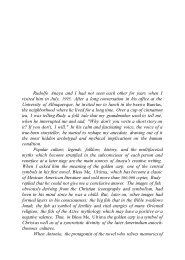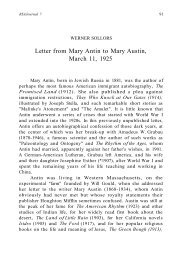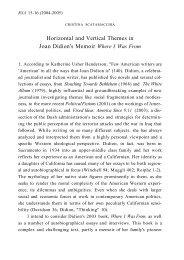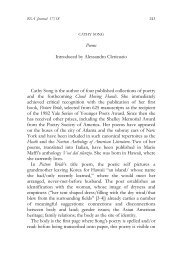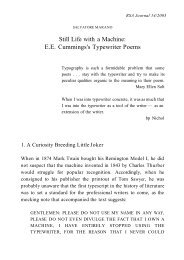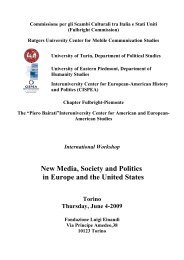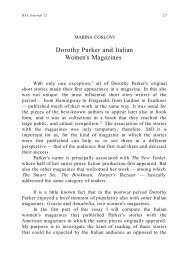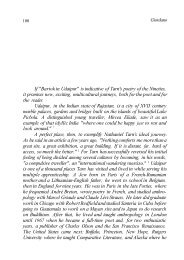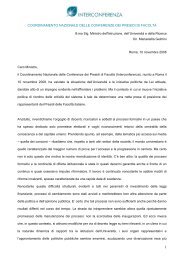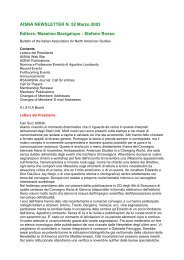An American Jeremiah in Rome: A Study of Margaret Fuller's ... - aisna
An American Jeremiah in Rome: A Study of Margaret Fuller's ... - aisna
An American Jeremiah in Rome: A Study of Margaret Fuller's ... - aisna
- No tags were found...
Create successful ePaper yourself
Turn your PDF publications into a flip-book with our unique Google optimized e-Paper software.
104 RS A Journal 11<br />
While she had then believed that the presence <strong>of</strong> democracy<br />
rendered America superior to Europe <strong>in</strong> spite <strong>of</strong> the latter's cultural<br />
patrimony, <strong>in</strong> revolutionary <strong>Rome</strong> she reversed the comparison to<br />
elevate Italy over America. By April 1848, she was writ<strong>in</strong>g to her<br />
readers that she could not be persuaded to return home because<br />
"My country is at present ... stupid with the lust <strong>of</strong> ga<strong>in</strong> [and] soiled<br />
by crime <strong>in</strong> its will<strong>in</strong>g perpetuation <strong>of</strong> Slavery", whereas <strong>in</strong> <strong>Rome</strong>,<br />
"amid the teach<strong>in</strong>gs <strong>of</strong> adversity a nobler spirit is struggl<strong>in</strong>g—a spirit<br />
which cheers and animates m<strong>in</strong>e." 3 Italy had seem<strong>in</strong>gly become <strong>in</strong><br />
her m<strong>in</strong>d freer than America.<br />
These statements, coupled with <strong>Fuller's</strong> praise <strong>of</strong> the conduct<br />
<strong>of</strong> the Roman revolutionists aga<strong>in</strong>st allegations that the city had<br />
fallen <strong>in</strong>to anarchy, her censure <strong>of</strong> the French military <strong>in</strong>tervention,<br />
and her repeated calls for <strong>American</strong> expressions <strong>of</strong> sympathy<br />
towards the new republic—not to mention her own participation <strong>in</strong><br />
the defense <strong>of</strong> <strong>Rome</strong> as the director <strong>of</strong> one <strong>of</strong> the city's hospitals<br />
for the wounded—have led critics to read <strong>Fuller's</strong> account <strong>of</strong> the<br />
Roman republic as an anomaly among <strong>American</strong> recreations <strong>of</strong><br />
mid-n<strong>in</strong>eteenth-century Italy. Accord<strong>in</strong>g to the accepted <strong>in</strong>terpretation<br />
<strong>of</strong> the Tribune dispatches, while her compatriots either ignored the<br />
Risorgimento altogether and cont<strong>in</strong>ued to perceive Italy <strong>in</strong> a purely<br />
aestheticized manner, or described it negatively and with the<br />
purpose <strong>of</strong> celebrat<strong>in</strong>g America's political exceptionalism, Fuller<br />
not only made contemporary Italy the focus <strong>of</strong> her narrative, but<br />
exalted Italian republicanism over <strong>American</strong> democracy. 4 Bell Gale<br />
Chevigny best expresses this critical consensus when she argues<br />
that Fuller was "radically apart" from those <strong>American</strong> travelers <strong>in</strong><br />
Italy who "came to confirm their sense <strong>of</strong> national superiority" and<br />
"refurbish their sense <strong>of</strong> special dest<strong>in</strong>y." 5 On the contrary, writes<br />
Chevigny, "Fuller denied the specialness and autonomy <strong>of</strong><br />
<strong>American</strong> dest<strong>in</strong>y [and] <strong>of</strong>fered the actual struggle <strong>of</strong> a foreign<br />
people as a guide to complet<strong>in</strong>g the <strong>American</strong> Revolution." 6<br />
This essay <strong>of</strong>fers a different <strong>in</strong>terpretation <strong>of</strong> <strong>Fuller's</strong><br />
encounter with Italy. Instead <strong>of</strong> read<strong>in</strong>g her negative comparison<br />
between democracy <strong>in</strong> Italy and America <strong>in</strong> isolation, I situate it<br />
with<strong>in</strong> the broader context <strong>of</strong> <strong>American</strong> oratorical practices. I argue<br />
that, far from be<strong>in</strong>g an exceptional and unprecedented statement,



